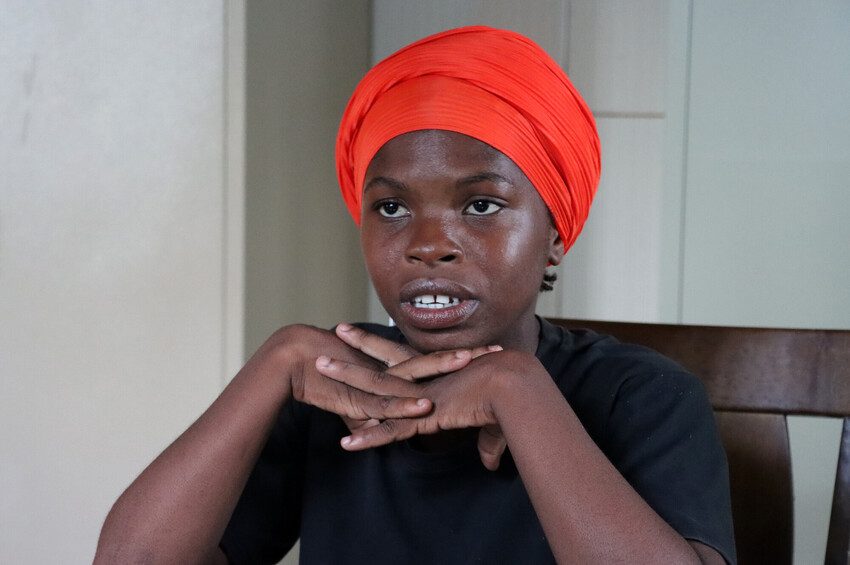Young peacebuilder supports girls and children
Mariamo is young peacebuilder, focused on supporting girls and children and spreading the message that acts of kindness, however small, can have a huge impact on lives.

Mariamo, 20, is an internally displaced young woman, who was forced to leave her home village due to the conflict, which has escalated since 2017.
Mariamo shares, “I became interested in peacebuilding after the experience we had when we arrived in Chiúre. We were fleeing armed attacks and the host communities did not welcome us. They were hostile, humiliated us and didn’t want us there. I found it all very sad and inhuman, because war does not choose its victims.”
“It was worst when my family and other displaced people received food aid from NGOs or the government. The host communities complained that they should get something too and blamed us.
Becoming a peacebuilder
“When I heard that Plan International had a peacebuilding project, I decided to get involved. I learnt how important it is not to discriminate against others, and that we need to prioritise harmony between everyone, even if there are differences, because in the context of war and displacement there is always a clash of cultures and interests. I also learnt about human rights, the rights of children, girls and women.
“Acts of kindness and tolerance, however small, can have a huge impact.”
Mariamo
“As you can imagine, the priorities of displaced people are very much focused on finding food and other means of subsistence and also about family members that they have become separated from when they fled their villages.
“People are so stressed that they have little interest in listening to lectures. However, I continue to organise talks and trainings on social cohesion and peacebuilding.
Focusing on girls and children
“I have faced several challenges when giving talks on peacebuilding. Conversations with other adults often don’t go very well because of the context we are in, which is very stressful. So my approach is to focus on girls and children. I give them advice on how to deal with conflict, what their rights are and how they can get help if something more serious happens, such as some form of abuse.
“Girls and women suffer a lot in conflict. These situations put girls and women at risk of abuse and violations of their rights, which can occur in the resettlement centres, during the flight or even in the host communities. Women have special needs in terms of personal care and menstrual hygiene, and if they are pregnant, for example, they need to go to the health centre. Most of the time they do not have access to these services.
“I am currently doing a nutrition course and I want to help girls and women in my community learn how to make better use of locally available food. There is often hunger in the community, but people do not always take advantage of the food that is available and has nutritional value.
“One cause that I have always defended is children’s rights. Because of the war, hundreds of children have had to flee their homes, leaving everything behind. I think about how difficult it is for them to integrate into a new school in a new community.
“My approach is to focus on girls and children. I give them advice on how to deal with conflict, what their rights are and how they can get help .”
Mariamo
“I want to continue to work in communities to build peace. We must continue to give hope to young people and adults. People need to know that their acts of kindness and tolerance, however small, can have a huge impact on their lives and the lives of so many others in the community.
“My deepest wish is that this war will end soon. People are suffering and they have nothing to do with the causes. We don’t know if the armed gangs want to rule us or if they want the province’s natural resources. All we know is that our lives, our futures, are threatened by this situation. If the war would stop, I would be more than happy because I could go back to my home village and start my life with my family again. I appeal to our governments to resolve this situation.”
Plan International peacebuilding project
In Mozambique’s IDP camps and resettlement centres, people face many difficulties, including hostility from host communities, who often prevent them from accessing fields to grow crops and forests to collect firewood.
To help defuse the growing tensions between internally displaced persons (IDPs) and host communities, Plan International implemented a peacebuilding project to train young people in mediation skills so they could intervene in camp and host community disputes and bring about an agreement or resolution. Supported by UNHCR, 129 young people (70 female and 59 male) participated in a five-day training session, learning a wide range of peacebuilding skills based on a human rights framework.
Following their training, the young people developed promotional materials, began conducting awareness sessions and created posters with messages of peace to help IDPs and host communities learn how to live and work together. The posters were translated into local languages for maximum reach.
Northen Mozambique has been experiencing armed violence since 2017, affecting more than half a million people who have been displaced from their homes. Since 2021, Plan International has provided assistance to more than 145,484 people displaced by the conflict, including 55,493 girls, 51,625 boys, 21,603 women and 16,736 men.
Categories: Emergencies


